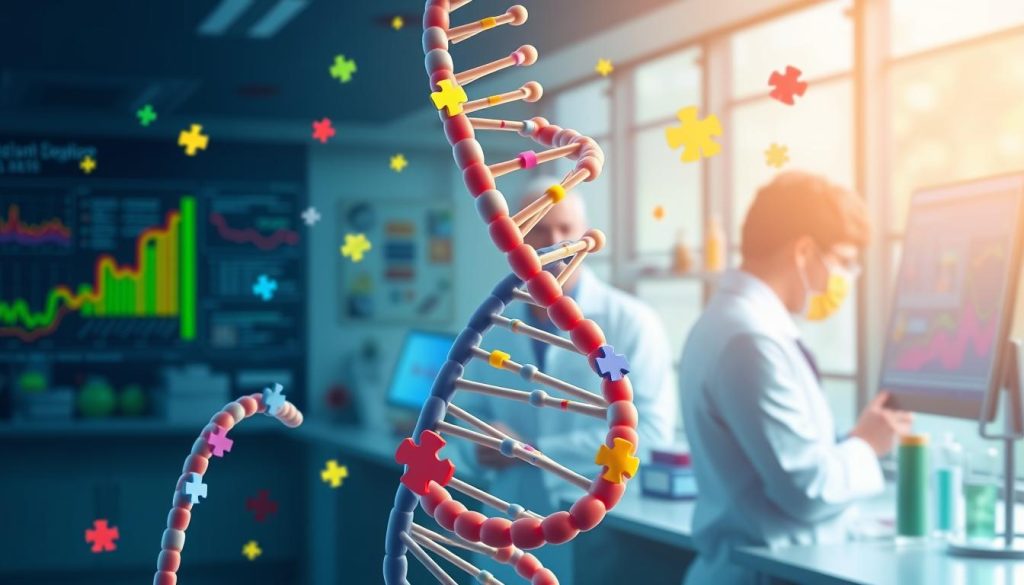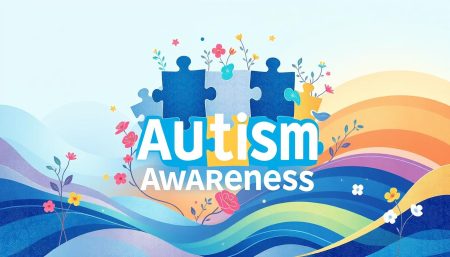Autism spectrum disorder (ASD) impacts millions of families globally, sparking curiosity about its roots. Many ponder if autism is passed down through genes and how it develops. This piece dives into the complex realm of autism genetics, looking at the genetic risk factors scientists have found.
We’ll look at the newest studies on genetic changes, family history, and environmental factors that lead to ASD. Understanding these elements helps us grasp early detection, intervention, and support for those on the autism spectrum.
Let’s dive into the complex tie between genes and autism, shedding light on this intriguing field. We’ll see how heredity influences autism and its implications for families and healthcare workers.
Understanding Autism Spectrum Disorder Basics
Autism spectrum disorders are complex conditions that affect people differently. They are marked by challenges in social interaction, communication, and behavior.
Defining Autism and Its Core Characteristics
Autism is known for making social communication hard, leading to repetitive behaviors and a focus on specific interests. People with autism might find it tough to understand nonverbal cues or hold eye contact. They also might have a strong interest in certain topics or objects.
The Spectrum of Autism Manifestations
The term “spectrum” in autism spectrum disorders means there’s a wide range of symptoms and severity levels. Some people need a lot of support, while others can live on their own. This shows why it’s key to have personalized approaches to diagnosis and treatment.
Current Prevalence and Statistics
Recent studies have shown an increase in autism diagnoses. The Centers for Disease Control and Prevention say about 1 in 36 children in the U.S. has autism spectrum disorders. This rise might be because of better diagnostic tools and more awareness among healthcare providers and the public.
| Year | Prevalence Rate |
|---|---|
| 2000 | 1 in 150 |
| 2010 | 1 in 68 |
| 2023 | 1 in 36 |
It’s important to understand the basics of autism spectrum disorders for early identification and support. As research grows, we learn more about autism, leading to better help and outcomes for those on the spectrum.
Is Autism Hereditary: Exploring the Genetic Foundation
Scientists have long been curious about autism’s genetic roots. Research shows that genetics play a big role in autism. Families with autism often show a strong genetic link, pointing to certain genes that raise the risk of autism.
Autism’s genetic causes are complex. Unlike some conditions, autism isn’t caused by one gene. It involves many genes working together in a complex way. This makes it hard to predict who will get autism based on family history.
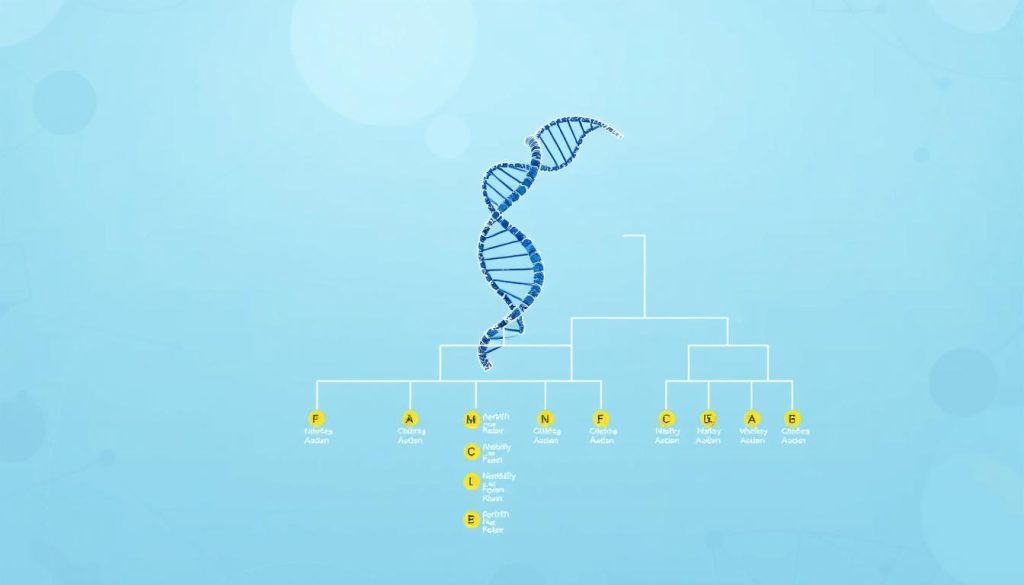
Scientists have found several genes linked to autism risk. These genes impact brain development and how brain cells talk to each other. Some genetic changes come from parents, while others happen randomly during early development.
| Genetic Factor | Impact on Autism Risk |
|---|---|
| Family history of autism | Increased risk |
| Specific gene mutations | Can significantly increase risk |
| Copy number variations | May contribute to autism development |
Understanding autism’s genetic causes is key for early diagnosis and help. As research goes on, scientists aim to predict autism risk better. They also want to tailor treatments to each person’s genetic makeup. This could lead to more effective ways to manage autism and support those on the spectrum.
The Role of Genes in Autism Development
Genes are key in autism spectrum disorder. Scientists have found many genes linked to autism. These genes help us understand autism better.
Known Genetic Mutations Associated with Autism
Researchers found certain gene mutations that cause autism. Genes like SHANK3, CHD8, and PTEN are involved. These changes can impact brain development and lead to autism symptoms.
Copy Number Variations and Their Impact
Copy number variations (CNVs) are also linked to autism. CNVs are when DNA segments are deleted or duplicated. For example, changes in the 16p11.2 region are often seen in autism.
Gene Expression Patterns in Autism
Studies show unique gene expression in autism. Some genes are over- or under-expressed. These changes can affect brain development and contribute to autism symptoms.
Learning about genes in autism is vital for better diagnosis and treatment. As research grows, we find more genes linked to autism. This helps us understand this complex disorder better.
Family History and Autism Risk Factors
Family history is key in understanding autism risk. Research shows that having a relative with autism raises your risk. This suggests a strong genetic link to autism spectrum disorders.
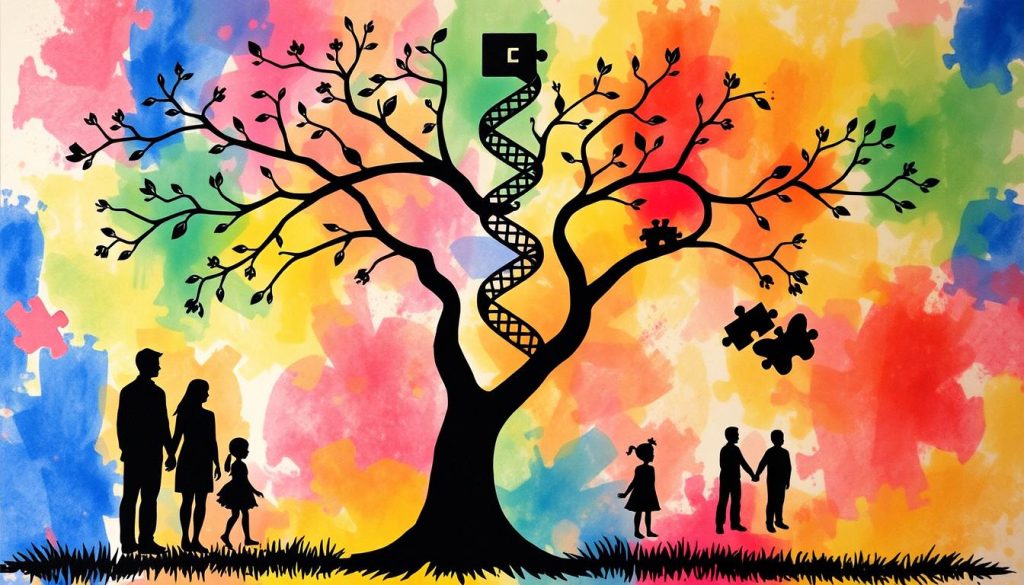
Studies show siblings of children with autism are more likely to have it too. The risk is even higher for identical twins, showing the role of genetics. Parents with one autistic child are more likely to have another.
Genetic risk factors for familial autism include:
- Inherited gene mutations
- Chromosomal abnormalities
- Copy number variations
These genetic factors can be passed down, increasing autism risk in families. But, having a family history of autism doesn’t mean you’ll definitely get it. Environmental factors also play a part in autism development.
Knowing your family history and genetic risks helps healthcare providers. They can offer better screening and early help. Families with autism history may get genetic counseling to understand their risks better.
Twin Studies and Autism Heritability Research
Twin studies give us important clues about autism’s genetic roots. They compare the autism rates in identical and fraternal twins. This helps us figure out how much genetics play a role in autism.
Identical vs. Fraternal Twin Studies
Identical twins have the same genes, while fraternal twins have about half the same genes. This lets researchers see how genes and environment affect autism.
Key Research Findings and Statistics
Research shows identical twins are more likely to both have autism than fraternal twins. This points to a big genetic link in autism spectrum disorders.
| Twin Type | Concordance Rate |
|---|---|
| Identical | 60-90% |
| Fraternal | 0-30% |
These results show genetics are a big part of autism, making up 50-90% of the risk. But genetics alone don’t explain why everyone gets autism.
Environmental Influences in Twin Studies
Twin studies also show how environment affects autism. Even in identical twins, not both always get autism. This shows that things outside of genes also matter in autism.
Researchers keep looking into how genes and environment mix in autism. These studies help us understand autism better. They might lead to new ways to prevent and treat it.
Inherited Autism Patterns Across Generations
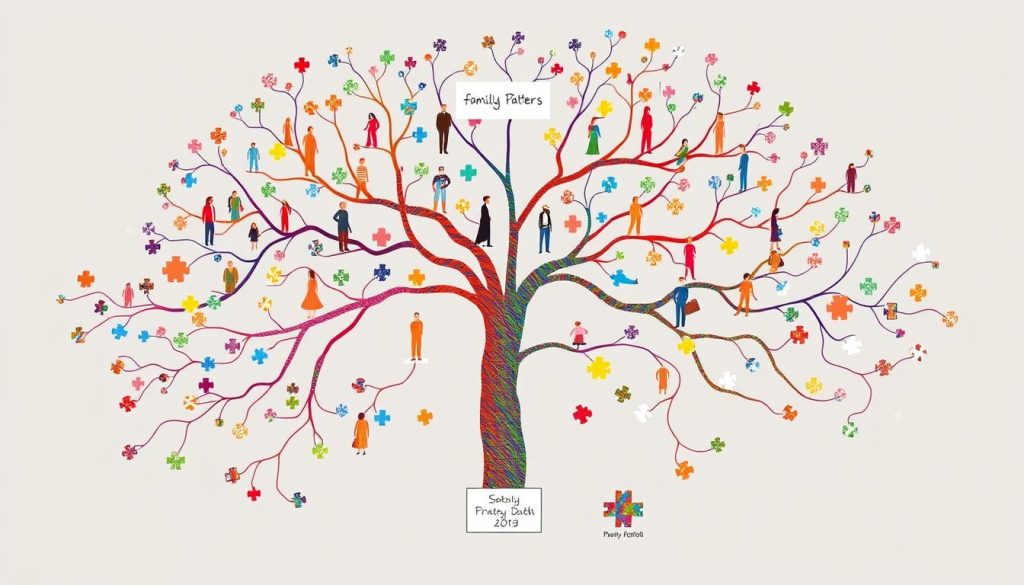
Autism inheritance patterns show a complex genetic landscape. Studies on familial autism reveal it can run in families but isn’t simple. Unlike single-gene disorders, autism involves many genes working together in complex ways.
Research on multigenerational families has shed light on autism’s hereditary nature. These studies track autism traits across several generations, showing patterns of inheritance. In some families, autism appears in every generation, while in others, it may skip generations or affect siblings differently.
The risk of autism increases in families with a history of the condition. Siblings of children with autism have a higher chance of developing the disorder. This familial clustering supports the genetic basis of autism spectrum disorders.
- First-degree relatives (siblings, parents) have a 10-20% higher risk
- Second-degree relatives (aunts, uncles, grandparents) show a 3-5% increased risk
- Third-degree relatives (cousins) have a slightly elevated risk compared to the general population
Understanding these autism inheritance patterns is key for genetic counseling and risk assessment. It helps families make informed decisions about future pregnancies and early intervention strategies. As research progresses, our knowledge of familial autism transmission continues to grow, bringing hope for better prediction and management of the condition.
Environmental Factors That Interact with Genetic Predisposition
Autism’s development is a mix of genetic and environmental factors. Knowing how these interact helps find ways to prevent it.
Prenatal Environmental Influences
Exposures during pregnancy can change how a fetus’s brain grows. Things like infections, stress, and toxins can raise autism risk in those who are genetically more likely to have it.
Early Childhood Environmental Factors
After a child is born, their environment keeps shaping their brain. Nutrition, toxins, and early life events can affect autism risk in those with a genetic tendency.
Gene-Environment Interactions
Genes and environment work together, not alone. Some genetic traits make people more likely to be affected by environmental risks. This can lead to or worsen autism symptoms.
| Environmental Factor | Potential Impact on Autism Risk |
|---|---|
| Maternal Infections | May increase risk in genetically susceptible fetuses |
| Prenatal Stress | Can alter fetal brain development |
| Certain Medications | Some may affect neural development |
| Early Nutrition | Influences brain growth and function |
| Toxic Exposures | Can disrupt normal neurodevelopment |
Researchers are working to understand these complex interactions. They aim to find better ways to prevent and treat autism. This knowledge helps spot those at higher risk and tailor support to them.
The Complex Nature of Autism Inheritance
Autism genetics is a mystery to researchers and families. It doesn’t follow simple patterns like other genetic conditions. Instead, it’s a mix of many genes and environmental factors.
Scientists have found hundreds of genes linked to autism. But no single gene causes it alone. This makes it hard to predict autism risk from family history or genetic tests.
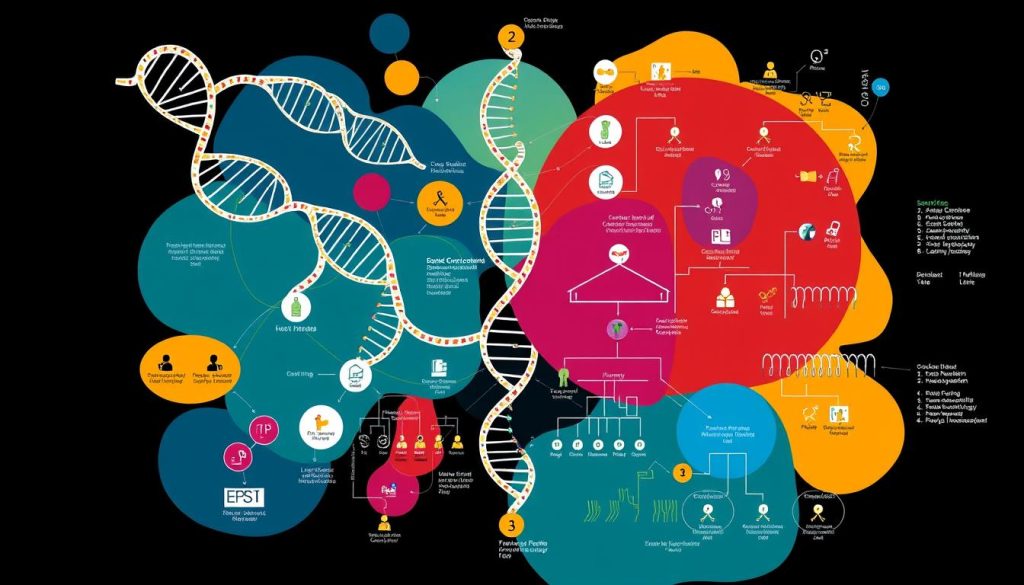
Families with many members affected by autism show its complex inheritance. Some siblings might share genes but have different symptoms. Others might have risk genes without autism.
| Inheritance Factor | Impact on Autism Risk |
|---|---|
| Single gene mutation | Low to moderate |
| Multiple gene variations | Moderate to high |
| Environmental influences | Variable |
| Gene-environment interaction | Significant |
Understanding autism inheritance is key for genetic counseling and research. It shows the need for detailed studies and personalized care for those on the spectrum.
Genetic Testing for Autism Risk Assessment
Genetic testing is key in understanding autism and its risk. It helps families make smart health choices for the future.
Available Testing Methods
There are many genetic tests for autism risk. Chromosomal microarray analysis finds big genetic changes. Whole exome sequencing looks at specific gene mutations. Targeted gene panels check known autism genes.
Understanding Test Results
Getting test results needs expert help. Positive results might mean higher autism risk. But, negative results don’t mean it’s out of the question. Sometimes, results are unclear, needing more tests or family studies.
When to Consider Genetic Testing
Genetic testing is suggested for those with autism symptoms or developmental delays. It’s also good for families planning a baby or looking for early help.
| Scenario | Recommendation |
|---|---|
| Child with autism diagnosis | Genetic testing advised |
| Sibling of child with autism | Consider testing for risk assessment |
| Family planning with autism history | Preconception genetic counseling |
| Prenatal concerns | Discuss testing options with healthcare provider |
Genetic testing offers insights into autism risk. But, remember, autism is complex. Environmental factors also affect its development. Talking to genetic counselors can guide families through the testing process and its meaning.
Recent Advances in Autism Genetics Research
Autism genetics research has seen big leaps forward. Scientists have found new insights into autism’s genetic causes. This knowledge could lead to better treatments and understanding.
One key finding is over 100 genes linked to autism. This discovery has broadened our understanding of autism’s genetic makeup. It shows that autism is caused by a mix of genes, not just one.
Advanced sequencing technologies have changed autism genetics studies. These tools let scientists look at DNA in new ways. They’ve found rare mutations that raise autism risk.
Another breakthrough is creating autism-specific stem cell lines. These cells help researchers study how genes affect brain development. This gives us a closer look at autism’s biological roots.
Now, research is moving towards personalized medicine. Doctors might soon use genetic profiles to tailor treatments. This could lead to more effective treatments and better lives for those with autism.
Impact of Gender on Autism Inheritance
Gender is key in how autism is passed down. Scientists have found interesting differences in autism between males and females. This helps families understand their risk.
Male vs. Female Inheritance Patterns
Boys are more likely to have autism than girls, with a 4:1 ratio. This shows genetics and gender interact in autism. Boys might be more prone to autism genes, while girls need more to show symptoms.
X-Chromosome Influence
The X-chromosome is important in autism. Girls have two X-chromosomes, which might protect them from autism genes. Boys, with only one X-chromosome, don’t have this protection. This could be why boys are more likely to inherit autism traits.
| Gender | X-Chromosomes | Autism Risk | Inheritance Pattern |
|---|---|---|---|
| Male | 1 | Higher | More direct |
| Female | 2 | Lower | More complex |
Knowing these gender-specific patterns helps researchers. It also helps families make better choices for genetic counseling and early intervention.
Common Genetic Syndromes Associated with Autism
Genetic research has found several syndromes linked to autism. These conditions help us understand autism susceptibility genes. They also show how inherited autism spectrum disorder works. Let’s look at some of these genetic syndromes and their link to autism.
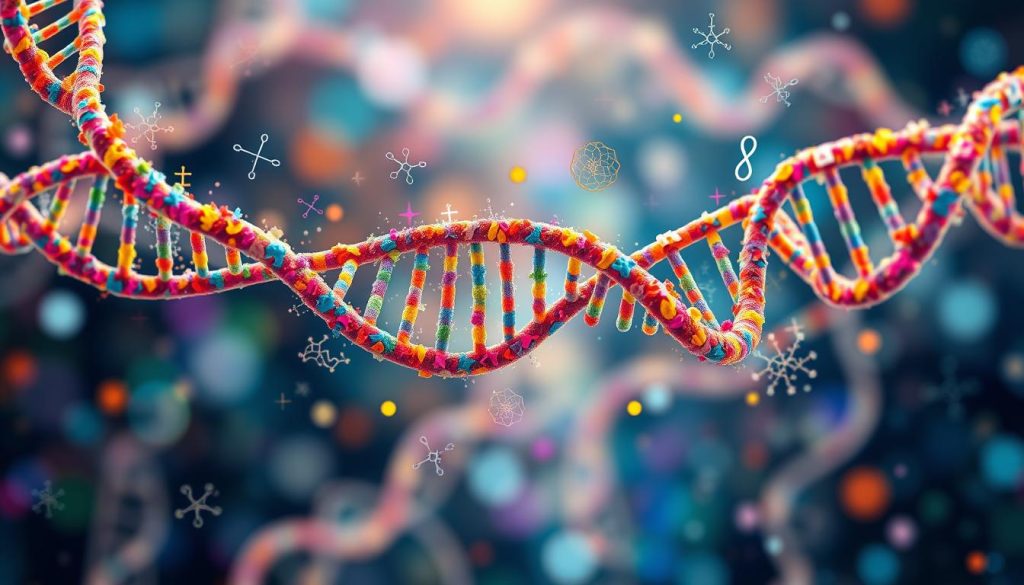
Fragile X syndrome is a key genetic condition linked to autism. It’s caused by changes in the FMR1 gene on the X chromosome. People with Fragile X often show traits like avoiding eye contact and repeating words or phrases.
Rett syndrome is another genetic disorder that affects brain development. It’s mainly seen in girls and can cause autism-like symptoms. The MECP2 gene is responsible for this condition, which impacts how the brain forms and works.
Tuberous sclerosis is a rare genetic disorder that can lead to autism. It’s caused by mutations in the TSC1 or TSC2 genes. This condition can cause growths in various organs, including the brain, which may trigger autism-like behaviors.
| Genetic Syndrome | Gene Involved | Autism-Related Traits |
|---|---|---|
| Fragile X | FMR1 | Social anxiety, repetitive behaviors |
| Rett Syndrome | MECP2 | Loss of speech, hand movements |
| Tuberous Sclerosis | TSC1/TSC2 | Developmental delays, seizures |
Understanding these genetic syndromes helps researchers find autism susceptibility genes. This knowledge is key for better diagnostic tools and treatments for inherited autism spectrum disorder.
Preventive Measures and Early Intervention
Understanding hereditary autism risk and autism genetics helps families take action. Early detection and intervention are key in managing autism spectrum disorders.
Risk Reduction Strategies
We can’t prevent autism completely, but some steps may help. Prenatal care is very important. Pregnant women should avoid harmful substances and eat well.
Early Detection Methods
Spotting autism signs early is critical. Doctors screen babies at 18 and 24 months. Parents should watch for developmental milestones.
Look out for signs like not making eye contact, not responding to their name, or delayed speech.
Intervention Programs
Early intervention can greatly help. Applied Behavior Analysis (ABA) therapy is often used. Speech and occupational therapy improve communication and daily skills.
Some programs teach parents how to support their child’s development at home.
Remember, each child with autism is different. What works for one might not work for another. Regular check-ups and talking with healthcare providers are vital in managing hereditary autism risk.
Genetic Counseling for Families
Families dealing with familial autism often look for guidance on their genetic risks. Genetic counseling is a valuable resource for those affected by autism or at higher risk. It helps families understand the complex world of autism heritability and make informed decisions.
Experts in genetic counseling review family history and discuss genetic testing options. They explain the possible outcomes. This information helps families make choices that fit their values and situation.
Genetic counselors address concerns about the risk of autism in future children or siblings. They help families understand test results and find the right resources. By exploring autism heritability, counseling prepares families for different scenarios and early intervention if needed.
Genetic counseling doesn’t solve all problems, but it gives families tools to handle familial autism. It creates a supportive space for families to ask questions, share concerns, and build confidence in their decisions. This personalized approach is key in a family’s autism journey.
FAQ
Q: Is autism purely genetic or can environmental factors play a role?
A: Autism is not just about genes. While genes play a big part, the environment also matters. Studies show that autism comes from a mix of genes and environmental factors, mainly during pregnancy and early childhood.
Q: How likely is it for parents with autism to have a child with autism?
A: Parents with autism are more likely to have a child with autism. But, the chance depends on several things like family history and specific genes. It’s wise to talk to a genetic counselor for a better understanding of your risk.
Q: Can autism skip generations?
A: Yes, autism can skip generations. The way autism is passed down is complex. Some people might carry genes for autism without showing symptoms. These genes can then cause autism in future generations.
Q: Are there specific genes that cause autism?
A: There’s no single gene for autism. Researchers have found hundreds of genes linked to autism risk. These genes affect brain development and how cells talk to each other. It’s the mix of these genes and the environment that leads to autism.
Q: How accurate are genetic tests in predicting autism risk?
A: Genetic tests can spot mutations linked to autism risk. But, they can’t say for sure if someone will get autism. The tests are not perfect because autism genetics are complex and the environment also plays a part.
Q: Why is autism more common in males than females?
A: Autism is more common in males because of genetics and sex hormones. Females might have a protective effect from their two X-chromosomes. This could help explain why males are more likely to have autism.
Q: Can siblings of children with autism also develop the condition?
A: Siblings of children with autism face a higher risk of autism. But, it’s not a guarantee. The risk depends on family history and specific genes.
Q: What are copy number variations (CNVs) and how do they relate to autism?
A: CNVs are changes in chromosomes that affect DNA. Some CNVs increase autism risk. These changes can alter gene function and play a role in autism.
Q: How does epigenetics contribute to autism risk?
A: Epigenetics deals with gene expression changes that don’t change the DNA. These changes can affect autism risk. Environmental factors can influence epigenetics, showing how genes and environment interact in autism.
Q: What role do twin studies play in understanding autism heritability?
A: Twin studies help figure out autism’s heritability. By comparing identical and fraternal twins, researchers can see how much genetics play a role. These studies show a strong genetic link to autism.












